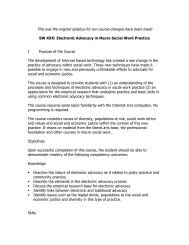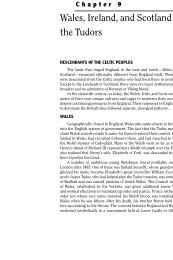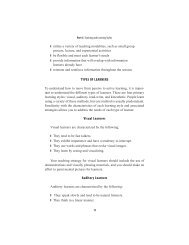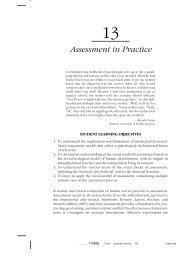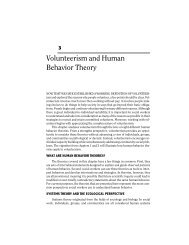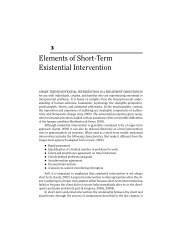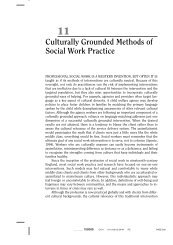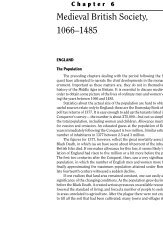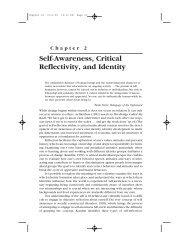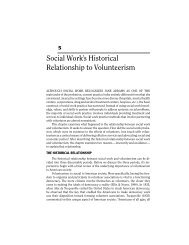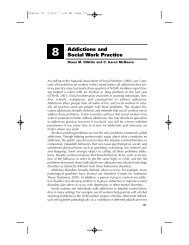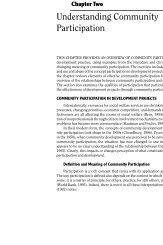Society and Economy in England, 1715–1763 - Lyceum Books
Society and Economy in England, 1715–1763 - Lyceum Books
Society and Economy in England, 1715–1763 - Lyceum Books
You also want an ePaper? Increase the reach of your titles
YUMPU automatically turns print PDFs into web optimized ePapers that Google loves.
54 Part I The Age of the L<strong>and</strong>ed Oligarchy<br />
carefully drawn up <strong>and</strong> defended by the law, provided that each <strong>in</strong>heritor got the<br />
l<strong>and</strong> under severe restrictions: he must not alienate (sell) any of it; it was thus<br />
entailed. By the pr<strong>in</strong>ciple of entailment, therefore, strict settlements turned the<br />
owner of an estate <strong>in</strong>to a sort of life tenant. A squire might settle his l<strong>and</strong> on his<br />
son, but on legal condition that the son <strong>in</strong> turn pass the estate to the gr<strong>and</strong>son. And<br />
the son, by powerful social custom, resettled the estate on his son by mak<strong>in</strong>g the<br />
same sort of will, <strong>and</strong> so on down the generations.<br />
This desire to keep estates <strong>in</strong>tact had heavy consequences for other sons <strong>in</strong> the<br />
family <strong>and</strong> for all daughters. Because only the eldest son would <strong>in</strong>herit, different<br />
means of support had to be found for all the other offspr<strong>in</strong>g. Here is where patronage,<br />
“friendship,” <strong>and</strong> “<strong>in</strong>terest” came <strong>in</strong>to play. With proper connections, younger<br />
sons could be sent <strong>in</strong>to the professions—the clergy, army, navy, or medic<strong>in</strong>e. Entry<br />
<strong>in</strong>to bus<strong>in</strong>ess was much less favored, s<strong>in</strong>ce work of a self-<strong>in</strong>terested sort was<br />
thought to be ta<strong>in</strong>ted by “trade” <strong>and</strong> therefore to some degree was dishonorable <strong>and</strong><br />
thus ungentlemanly. But no l<strong>and</strong>lord opposed money itself; hence the typical l<strong>and</strong>lord<br />
would be delighted if his sons married wealthy heiresses, regardless of the<br />
source of their fortunes. Marriage to a rich banker’s or merchant’s daughter might<br />
provide a f<strong>in</strong>ancial base for a second or third son from which he might launch an<br />
effort to buy an estate. In this way, there was an important flow of non<strong>in</strong>herit<strong>in</strong>g<br />
sons downward <strong>in</strong>to the professions, which over time helped to elevate the professions<br />
<strong>in</strong> status <strong>and</strong> which raised the status of mercantile daughters upward <strong>in</strong>to<br />
l<strong>and</strong>ed society. This upward <strong>and</strong> downward mobility helped bond l<strong>and</strong>ed <strong>and</strong> commercial<br />
wealth together.<br />
Daughters provided a major problem for l<strong>and</strong>own<strong>in</strong>g families, for they had to<br />
be married off well, without loss of status; yet the daughters rarely brought an<br />
estate with them. Women could own l<strong>and</strong>ed property, <strong>and</strong> a significant number<br />
(ma<strong>in</strong>ly widows) did; but the custom <strong>in</strong> l<strong>and</strong>ed families generally was to keep the<br />
estates <strong>in</strong> men’s h<strong>and</strong>s. Thus to f<strong>in</strong>d <strong>and</strong> secure suitable marriages for their daughters<br />
was a matter of ceaseless calculat<strong>in</strong>g <strong>and</strong> campaign<strong>in</strong>g for the l<strong>and</strong>owner <strong>and</strong><br />
his wife. To make his daughter attractive on the marriage market, a l<strong>and</strong>owner customarily<br />
bestowed a dowry on his daughter at the time of her marriage. These<br />
dowries might amount to thous<strong>and</strong>s of pounds, <strong>and</strong> everyone thought it perfectly<br />
proper if the prospective groom (or rather his family) barga<strong>in</strong>ed to get the dowry<br />
<strong>in</strong>creased. Thus, hav<strong>in</strong>g a bevy of daughters was a serious dra<strong>in</strong> on a family’s<br />
resources <strong>and</strong> was regarded by most l<strong>and</strong>lords as at best a mixed bless<strong>in</strong>g.<br />
These circumstances made marriage arrangements with<strong>in</strong> the l<strong>and</strong>own<strong>in</strong>g<br />
orders a matter of delicate negotiations <strong>and</strong> barga<strong>in</strong><strong>in</strong>g between families, not<br />
unlike diplomatic negotiations between countries. Family fortunes <strong>and</strong> the status<br />
of the l<strong>in</strong>eage were at stake, so parents played a major role <strong>in</strong> choos<strong>in</strong>g partners for<br />
their children. The precise weight assumed by parental op<strong>in</strong>ion varied from family<br />
to family, depend<strong>in</strong>g on the particular mix of personalities <strong>in</strong>volved. Moreover, the<br />
balance between parental choice <strong>and</strong> the young person’s preference was shift<strong>in</strong>g<br />
dur<strong>in</strong>g the century, as <strong>in</strong>dividualism, reason, <strong>and</strong> eventually romantic sensibility<br />
grew <strong>in</strong> cultural importance. As the decades passed, young people expected to play<br />
a bigger role <strong>in</strong> their own matchmak<strong>in</strong>g <strong>and</strong> the parents a lesser role. In the sev-



